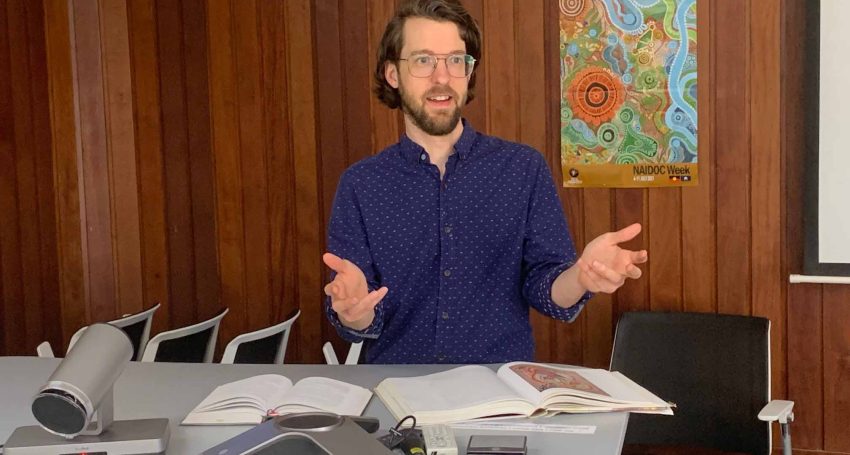What is the human being?
Reflections
“What this inability to answer definitively the question about what we are shows us is that the humanity of human beings is our exposure to ourselves and to the world as an unfinishable task. Human being is the search for the meaning of our being, a search that we will never exhaust,” says Dr Peter Kline from St Francis College

What makes human beings – human beings? How or where do we locate the humanity of human existence? One answer is that the very asking of this question is what marks the site of humanity. That is, the human being is that creature whose existence is essentially questionable, in the sense of being able to be a question for itself.
Human existence shows itself as questionable also in the sense of being problematic, or a conundrum, or a site of difficulty. On this account, powerfully articulated in the 20th century by the German philosopher Martin Heidegger, humanity has no “essence” that underlies its finitude. Stretched precariously between birth and death, human existence is essentially inessential, a passing, momentary event. Where we might wish to find a definitive answer to the question, “What is the human being?”, what we find instead is ourselves driven to a repetition and intensification of the question, “What IS the human being?” Or perhaps more personally, “Who AM I?” What this inability to answer definitively the question about what we are shows us is that the humanity of human beings is our exposure to ourselves and to the world as an unfinishable task. Human being is the search for the meaning of our being, a search that we will never exhaust.
No doubt the life of other creatures is also an unfinishable task. Being a mountain is an unfinishable task, as is being a galaxy or a jellyfish or a social media network. And yet that thing – or no-thing – in everything that makes all things unfinished is for the human being the source of unique difficulties and possibilities. We human beings are uniquely driven by our unfinishedness. It drives us toward immense creativity and openness to what might be, while also driving us toward denials of and defences against our incompletion, usually at the expense of others. Negotiating the tension of these drives is, depending on one’s perspective, either the burden or the gift of being human. Perhaps it is both.
Christian theology has its own ways of affirming the openness and incompletion of human existence, as well as its own ways of defending against it. The Christian notion of “being made in the image of God,” which is how Christians most typically mark what is unique about humanity, works in both directions. On the one hand, if God is infinite mystery, as Christians often affirm, then the image of that mystery is also a mystery, unable to be captured or limited by direct definitions or accomplished identities. Moreover, if the goal of human existence is union with God, as Christians often affirm, then “human being” cannot be defined ahead of the fullness of time. We do not yet know what we will be, or what we will have been, so perhaps it’s best to avoid setting up limiting or constricting parameters in the meantime. For instance, the Early Church father Gregory of Nyssa thought that resurrected bodies in heaven would be androgenous, neither male nor female. If this is the goal of human existence, a transformation beyond bounded gender identities, then perhaps it’s best that we avoid investing too much in those identities in our earthly lives. Paul makes a similar point in 1 Corinthians 7 with his declaration that “the present form of this world is passing away.” Because none of our identities or positions in the world is ultimately what God is making of us, we should live “as if” those identities and positions are nothing. This does not mean that we ought to destroy or deny them, but that we ought to wear them loosely, with humility and humour.
Advertisement
On the other hand, Christians have often given constricting parameters to the idea of being made in the image of God. Augustine and Aquinas, two hugely influential theologians, both affirm that only men fully bear the image of God, while women bear it in a lesser manner. Women display God’s image only as they fulfill their subordinate, supportive role in relation to men. The implication of this line of thought is that full human maturity is available only to a particular genre of human beings, namely, Christian men.
Over the course of the last 500 years, this idea that full human maturity is the purview of a limited slice of humanity has had far reaching and devastating consequences for the entire globe. As Christian mission and European colonial endeavours joined forces over this stretch of history, leading to the colonisation and missionisation of roughly 85 per cent of earth’s lands, what slowly but surely emerged was a universal ideal of human maturity centred around the European, Christian, male body – the white body. It was 16th century Spanish missionaries who first designated themselves as “white,” initially simply to designate their difference from the Indigenous peoples they were encountering in foreign lands.
Advertisement
However, what “white” came to signify was not simply a benign difference of pigmentation, but the fullness of human maturity toward which all peoples on the earth ought to be drawn. This vision of human maturity outgrew its initial Christian origins as the centuries went by, but the ideal of whiteness still holds for us even today the aura of salvation and the promise of the divinised human being. At the heart of the maturity that is whiteness is the image of the self-sufficient man, an owner of people and property, a shrewd investor, a manager of resources, a master of the earth.
This summer I will teach a subject at St Francis College called ‘THL245 God and Humanity’. We will look at the legacy of Christian theology through lenses of four topics that are of vital contemporary concern: sex and gender, disability, race and ecological crisis. What I want myself and my students to wrestle with is this dual legacy of the Christian approach to the humanity of human beings. Christian theology has offered postures of reverent unknowing in relation to human beings, and it has also offered postures of violent categorisation and segregation. And most often, these postures come entangled within each other so it is not a simple matter of choosing the good Christianity over the bad Christianity.
The work of theology that I want to invite my students into is the work of sorting through the entangled, complicated legacy of thinking about human beings that we have inherited so that together we can find ways of recognising and embracing the humanity of ourselves and our neighbours as an unfinishable task. What I hope my students walk away with is not a definitive answer to the question, “What is the human being?” but a sense of wonder in the face of the mystery of humanity that we must learn to bear as both gift and burden.
Peter Kline is the academic dean and lecturer in systematic theology at St Francis College. ‘THL245 God and Humanity’ will be taught in intensive form over summer on 4 and 18 December and on 22 and 29 January. For more information contact Peter at pkline@ministryeducation.org.au.
Editor’s note: If you found this feature fascinating and you would like to know more about studying theology, come to the St Francis College Open Day and find out about our wide range of study options. Visit the St Francis College website to register or for more information. The Virtual Open Day will be held on Tuesday 2 November at 7 – 8.30 pm and the On-campus Open Day will be held on Thursday 4 November at 12 noon – 2 pm and 5 – 7 pm.






